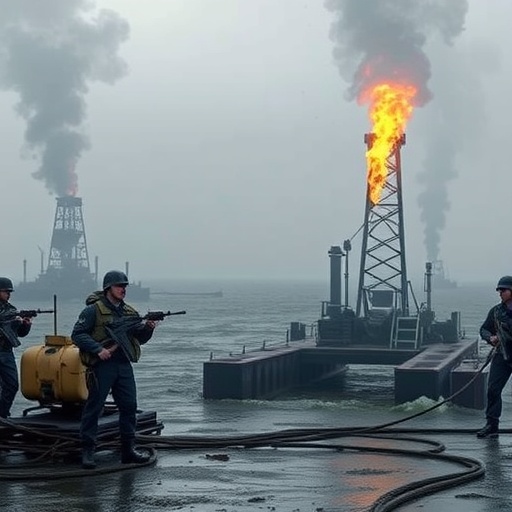UK and Allies Vow to Eliminate Russian oil from Global Markets as Ukraine War Intensifies
In a bold escalation of economic warfare against Russia’s invasion of Ukraine, British Prime Minister Keir Starmer announced on Thursday that the UK and its allies have forged a unified plan to systematically remove Russian oil and gas from the global market. This pledge emerged from a high-stakes meeting in London with Ukrainian President Volodymyr Zelensky, where leaders of the so-called Coalition of the Willing recommitted to Ukraine support through intensified sanctions. As the war enters its third year, this move signals a potential seismic shift in global energy dynamics, aiming to starve Moscow’s war machine of vital revenue streams estimated at over $100 billion annually from fossil fuel exports.
- Starmer and Zelensky Forge Ironclad Alliance in London Summit
- Allies Outline Aggressive Strategy to Squeeze Russian Energy Exports
- Economic Ripples: How Sanctions on Russian Oil Reshape Global Trade
- Zelensky’s Urgent Call Galvanizes Western Resolve Against Russian Aggression
- Path Forward: Enforcing the Pledge and Sustaining Momentum
The announcement comes amid mounting pressure from frontline reports of Russian advances in eastern Ukraine and renewed calls from Kyiv for unwavering Western backing. Starmer, addressing a press conference alongside Zelensky, emphasized that “the time for half-measures is over.” This commitment not only underscores the UK’s leadership role in the alliance but also highlights the growing frustration with Russia’s evasion of existing sanctions via shadow fleets and third-party trades.
Starmer and Zelensky Forge Ironclad Alliance in London Summit
The Coalition of the Willing gathering at 10 Downing Street marked a pivotal moment in the international response to the Ukraine crisis. Hosted by Keir Starmer, the summit brought together representatives from key allies including the United States, Canada, Germany, France, and several European nations, all united in their resolve to bolster Ukraine support. President Zelensky, arriving fresh from the battlefields, delivered a poignant address recounting the human cost of the conflict—over 500,000 casualties on both sides and millions displaced—while urging the group to target Russia’s economic lifelines.
“Russia’s oil is the blood of our soldiers,” Zelensky stated, his voice steady but laced with urgency. Starmer echoed this sentiment, revealing that the coalition had deliberated for over eight hours on strategies to enforce a comprehensive ban on Russian oil. Sources close to the talks indicated that the plan includes coordinated diplomatic pressure on neutral buyers like India and China, who have absorbed much of Russia’s redirected exports since the 2022 invasion. The UK’s foreign secretary, David Lammy, added that new intelligence-sharing mechanisms would help track and intercept Russian oil tankers operating in international waters.
This London summit builds on previous G7 commitments, but insiders describe it as more actionable, with specific timelines for implementation. For instance, the UK plans to introduce legislation within the next parliamentary session to criminalize dealings in sanctioned Russian oil, potentially fining violators up to £1 million. Zelensky praised the UK’s initiative, noting it as a “game-changer” for sustaining Ukraine’s defense efforts, which have relied heavily on Western arms and financial aid totaling €150 billion since the war began.
Allies Outline Aggressive Strategy to Squeeze Russian Energy Exports
At the heart of the coalition’s pledge is a multi-pronged strategy to dismantle Russia’s dominance in global energy markets. Currently, Russian oil accounts for about 10% of worldwide supply, with exports valued at $180 billion in 2023 despite sanctions. The new plan calls for expanding the EU’s existing oil embargo—already in place since December 2022—to include refined products and liquefied natural gas (LNG), while the UK pushes for a global price cap enforcement mechanism stricter than the current $60 per barrel G7 limit.
Key elements of the strategy, as detailed in a joint communique, include:
- Enhanced Maritime Enforcement: Allies will deploy additional naval assets in the Baltic and Black Seas to monitor and deter Russian oil shipments, building on recent seizures of shadow fleet vessels.
- Financial Chokepoints: Targeting banks and insurers that facilitate Russian oil trades, with the UK committing £500 million to a new fund for de-risking compliant energy imports from alternative suppliers like Norway and the US.
- Diplomatic Outreach: Engaging OPEC+ members to offset any supply disruptions, ensuring global energy stability while isolating Russia.
Starmer highlighted the economic rationale, stating, “By removing Russian oil from the equation, we not only weaken Putin’s aggression but also accelerate the world’s transition to cleaner energy sources.” Experts estimate that full implementation could slash Russia’s oil revenues by 40-50% within a year, forcing budget cuts to its military spending, which has surged to 6% of GDP.
The plan also addresses gas dependencies, particularly in Europe, where Russia once supplied 40% of needs. With pipelines like Nord Stream severed, the focus shifts to LNG terminals, but coalition members agreed to phase out any remaining Russian imports by 2025, redirecting funds to Ukraine support initiatives such as rebuilding infrastructure devastated by drone strikes.
Economic Ripples: How Sanctions on Russian Oil Reshape Global Trade
The ripple effects of this anti-Russian oil campaign are poised to transform international trade patterns. In the UK, where Russian oil imports have already dropped 90% since 2022, the policy aligns with domestic goals to boost North Sea production and secure deals with Qatar and Australia for LNG. However, analysts warn of short-term price volatility; Brent crude has hovered around $80 per barrel recently, and a tighter squeeze could push it toward $100, impacting inflation in sanctioning countries.
According to a report from the International Energy Agency (IEA), global oil markets have absorbed the initial shock of sanctions through increased US shale output—now at 13 million barrels per day—and Saudi Arabia’s spare capacity. Yet, the coalition’s pledge introduces new uncertainties. “This is a high-stakes gamble,” said Fiona Hill, a Russia expert at the Brookings Institution. “If allies stay united, Russia faces isolation; if not, black markets thrive.”
For Ukraine, the economic leverage is immediate. Oil revenues fund 30% of Russia’s federal budget, supporting everything from missile production to troop salaries. By curbing this, the UK and allies aim to prolong Ukraine’s resilience, where GDP contracted 30% in 2022 but is rebounding with 5% growth projected for 2024, buoyed by Ukraine support packages. Quotes from business leaders underscore the shift: BP’s CEO, Murray Auchincloss, welcomed the move, noting it could create 50,000 green jobs in the UK alone through accelerated renewables investment.
Challenges persist, however. Russia’s pivot to Asia has seen exports to India rise fivefold to 1.5 million barrels daily, often rebranded to evade caps. The coalition plans countermeasures like satellite tracking and secondary sanctions on complicit refineries, but enforcement will test international law. In a related development, the US Treasury announced parallel actions, freezing assets linked to Russian oil oligarchs, further tightening the noose.
Zelensky’s Urgent Call Galvanizes Western Resolve Against Russian Aggression
President Zelensky’s presence at the London summit injected raw emotion into the proceedings, reminding leaders of the war’s toll. In private sessions, he shared accounts from Kharkiv and Donetsk, where Russian forces have intensified assaults using Iranian drones and North Korean munitions. “Every barrel of Russian oil sold funds these atrocities,” he told the group, prompting nods of agreement and fresh pledges totaling €10 billion in immediate aid.
Keir Starmer, leveraging his Labour government’s pro-Ukraine stance, positioned the UK as a moral and strategic anchor. Since taking office in July 2024, Starmer has visited Kyiv twice and increased military aid to £3 billion annually. This summit reinforces that trajectory, with the coalition agreeing to supply long-range missiles and air defense systems to counter Russia’s aerial dominance. Public opinion in the UK remains supportive, with polls showing 70% favoring sustained Ukraine support, though concerns over energy costs linger.
Broader geopolitical context adds weight: NATO’s recent summit in Washington reaffirmed Article 5 commitments, while China’s neutral stance draws scrutiny. Zelensky called for inclusive diplomacy, suggesting that sidelining major powers could undermine the sanctions regime. Echoing this, French President Emmanuel Macron, attending virtually, stressed multilateralism to prevent energy weaponization in future conflicts.
Path Forward: Enforcing the Pledge and Sustaining Momentum
Looking ahead, the coalition’s success hinges on swift execution and adaptability. The UK will lead a working group to monitor progress, with quarterly reviews starting in January 2025. Initial steps include joint exercises to interdict Russian oil carriers and incentives for businesses switching suppliers, potentially unlocking $20 billion in trade opportunities for non-Russian producers.
Implications extend beyond energy: this pledge could embolden further sanctions on Russian metals and diamonds, diversifying pressure points. For Ukraine, it means more resources for reconstruction—estimated at $500 billion—fostering long-term stability. Starmer concluded the summit optimistically: “Together, we’re not just supporting Ukraine; we’re reshaping a rules-based world order.” As winter approaches and Russian offensives loom, the alliance’s unity will be tested, but the London commitments offer a beacon of hope amid the fog of war.
In related news, energy markets reacted positively, with European gas futures dipping 2% on expectations of diversified supplies. Watch for upcoming UN discussions on enforcing global sanctions, where the UK’s voice will be pivotal.








